The global pandemic in which we have been immersed for months has changed many things. Indeed, no one has been immune to periods of isolation, the risks of contagion from the virus, and unfortunately, the criminal opportunities that arose. Indeed, several waves of attempted fraud have made headlines in recent months. Fraudsters seem likely to seize the new criminal opportunities that emerge from the significant changes in our society.
Periods of isolation have caused millions of people to transfer their day-to-day activities, jobs, hobbies, and social interactions via the internet. The decrease in human presence on the streets seems to have reduced the crime rate in them. However, we should not be talking about a decrease in global crime, but more about a displacement of crime. Indeed, street crimes would have turned into cybercrimes.
Researchers Buil-Gil, Miró-Llinares, Moneva and al. wanted to look specifically at the presence of a possible increase in cybercrimes in the UK during the months of the very strict lockdowns due to COVID-19. The goal is mostly to observe the shift in criminal opportunities from physical to virtual.
To do this, the researchers analyzed data on cybercrimes recorded between May 2019 and May 2020 to explore the potential effects of COVID-19. Specifically, they investigated the following crimes:
- Virus, malware, spyware
- Denial of service attack
- Server, personal, social media, and email hacking.
- PBX – Dial through hacking
- Ransomware
- Online fraud

Briefly, the study results conclude that computer crime and online fraud have increased significantly since March 2020, the month that began the period of confinement in the UK. Table 1 and Figure 2 show the quantifiable increase in cybercrime and fraud cases. It is also possible to observe a slight decrease in computer attacks against organizations, but a considerable increase in attacks against individuals, suggesting a shift in targets for criminals.


In addition to its empirical contribution, this study is one of the pioneers in assessing cybercrime changes influenced by the global pandemic. It will be interesting to carry out a rigorous follow-up on this data to observe the situation’s evolution and the police response to this significant increase in cybercrimes.



